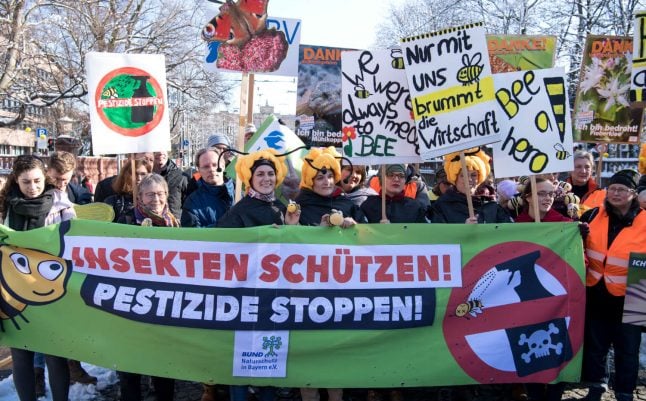The landmark move comes amid increasingly alarming warnings from scientists that nearly half of all insect species are in rapid decline – a third of the crucial pollinators threatened with extinction.
A petition launched in February which called for a referendum to seek better protection of plant and animal species had become the most successful in the southern German region's history, garnering 1.75 million signatures. Around 18.3 percent of eligible voters took part.
SEE ALSO: Bavaria celebrates most successful referendum ever – to save its bees
The proposal in the state, best known for its Oktoberfest and lederhosen, set a target for 20 percent of agricultural land to meet organic farming standards by 2025, before reaching 30 percent by 2030.
Das geht runter wie Honig: Der Gesetzentwurf des @VArtenvielfalt wurde von der Staatsregierung angenommen. Danke an alle Unterstützer*innen – das ist euer Erfolg! Zum Statement von @LudwigHartmann: https://t.co/f9wgUx8KAc #WirRettenDieBienen pic.twitter.com/JMvU8uStJu
— GRÜNE Bayern (@Gruene_Bayern) April 3, 2019
The Greens in Bavaria tweeted to say thanks to everyone who supported the petition. “This is your success!” they said.
Ten percent of green spaces in Bavaria would have to be turned into flowering meadows, and rivers and streams better protected from pesticides and fertilizers.
Rather than putting the petition to a referendum, Bavaria's state premier Markus Söder announced it would simply be written into law, passing through parliament.
“We are taking the text of the referendum word for word,” said Söder, leader of the conservative Christian Socialists (CSU), the Bavarian sister party of the CDU, which governs the state in a coalition majority.
 Photo: DPA
Photo: DPA
The farming industry, which had sometimes felt marginalized in the environmental debate, would have to be given support to carry out the transformation, he added.
SEE ALSO: Bavarians brave cold to campaign to save bees
'Mass extinction'
Scientists in Germany and worldwide have sounded the alarm about massive insect losses in terms of species diversity and total biomass, with dire consequences for the animals that feed on them and for plants that require
them for pollination.
The recent bug decline is seen by experts as part of a gathering “mass extinction” of species, only the sixth in the last half-billion years.
“Unless we change our way of producing food, insects as a whole will go down the path of extinction in a few decades,” concluded a peer-reviewed study by Francisco Sanchez-Bayo of the University of Sydney and Kris Wyckhuys of the University of Queensland in Australia.
A 2016 study found that about 1.4 billion jobs and three-quarters of all crops depend on pollinators, mainly bees, which provide free plant fertilization services worth billions of dollars.
SEE ALSO: The winners and losers: 7 things to know about the Bavarian election



 Please whitelist us to continue reading.
Please whitelist us to continue reading.
Member comments